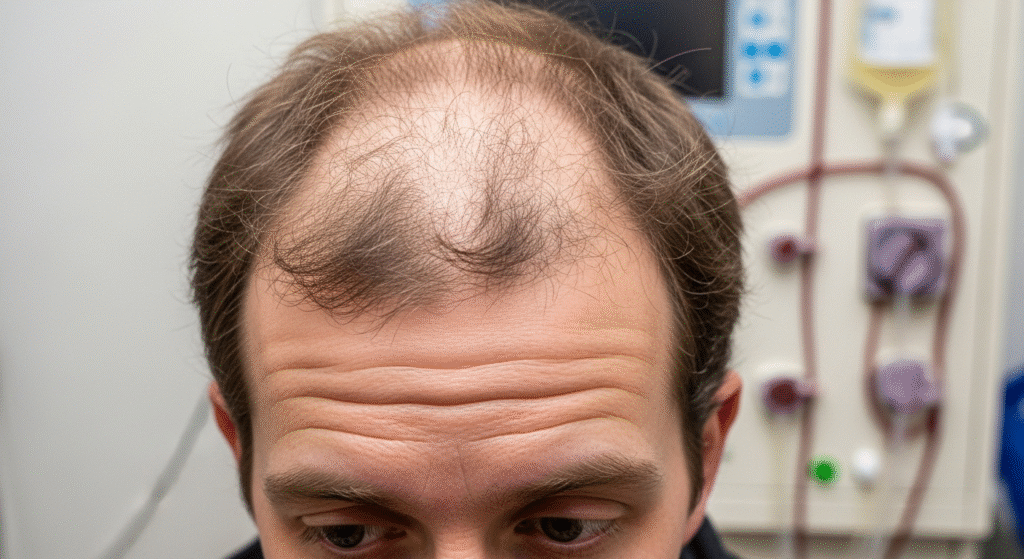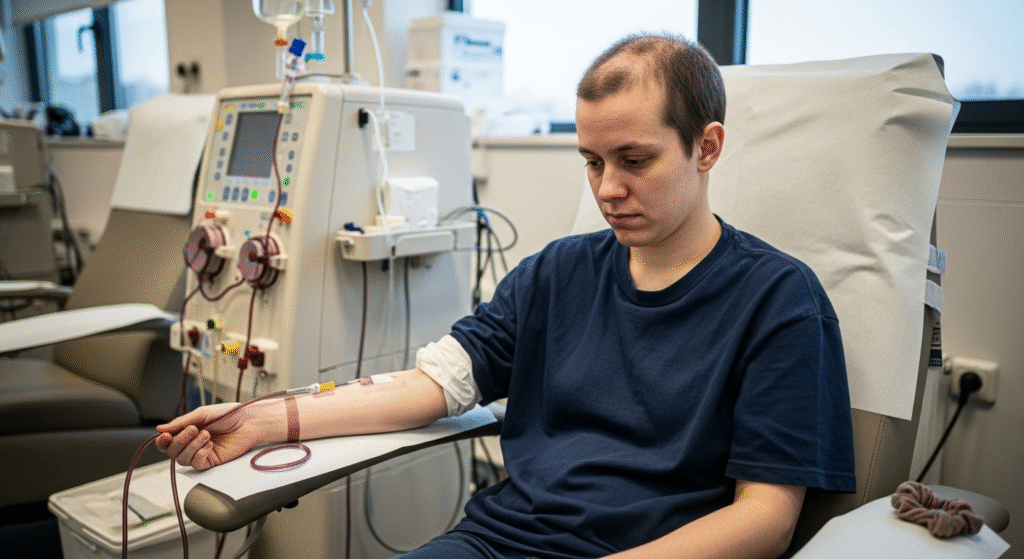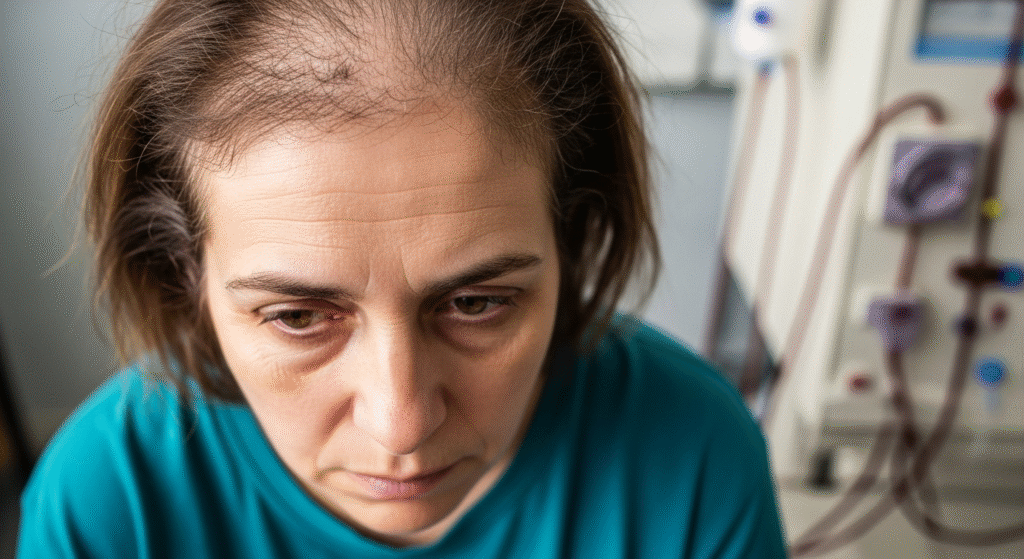Dialysis is a life-saving treatment for people with kidney failure, but it comes with its own set of side effects. One common concern among dialysis patients is hair loss. If you're wondering, "Does dialysis cause hair loss?", you're not alone. This article will explore the connection between dialysis and hair thinning, explain why it happens, …
Dialysis is a life-saving treatment for people with kidney failure, but it comes with its own set of side effects. One common concern among dialysis patients is hair loss. If you’re wondering, “Does dialysis cause hair loss?”, you’re not alone.
This article will explore the connection between dialysis and hair thinning, explain why it happens, and offer actionable tips for managing and preventing it. By the end, you’ll have a clearer understanding of how dialysis affects hair health and what steps you can take to protect your hair.

What Is Dialysis and How Does It Work?
Understanding Dialysis Treatment
Dialysis is a medical procedure designed to replicate the function of the kidneys when they can no longer effectively filter waste and excess fluids from the body. There are two main types of dialysis: hemodialysis and peritoneal dialysis.
- Hemodialysis: Blood is filtered outside the body through a machine, removing toxins and excess fluids.
- Peritoneal Dialysis: A special fluid is introduced into the abdomen to absorb waste products, which are later drained out.
Both types of dialysis are crucial for patients suffering from kidney failure, providing them with the necessary support to survive and manage their condition.
Common Side Effects of Dialysis
While dialysis is life-saving, it can come with several side effects that impact the body, such as:
- Fatigue
- Muscle cramps
- Dehydration
- Low blood pressure
- Hair loss
Hair loss is one of the concerns that many dialysis patients experience. It may not affect everyone, but it’s a side effect that many have reported during their treatment.
The Link Between Dialysis and Hair Loss

Does Dialysis Directly Cause Hair Loss?
The question of whether dialysis directly causes hair loss is not straightforward. While dialysis itself doesn’t necessarily cause hair loss, it can contribute to conditions that lead to thinning or shedding. Kidney disease, as well as the dialysis process, can disrupt normal hair growth cycles.
Here’s how:
- Hormonal Imbalance: Kidney failure and dialysis can affect hormone levels, leading to changes in the hair growth cycle, resulting in hair thinning.
- Stress: The physical and emotional stress of dealing with chronic kidney disease and dialysis can cause hair loss, often leading to telogen effluvium, a condition where hair falls out due to stress.
How Dialysis Affects Hormones and Hair Growth
Kidney failure disrupts the body’s ability to regulate hormones, which in turn can impact the hair growth cycle. Elevated levels of stress hormones, like cortisol, are often seen in dialysis patients, contributing to hair loss. Moreover, dialysis can lead to lower levels of the hormone erythropoietin (EPO), which is crucial for red blood cell production and overall hair health.
Why Does Dialysis Cause Hair Loss?
Stress and Its Impact on Hair Health
Stress is one of the leading causes of hair loss in dialysis patients. The emotional toll of living with a chronic condition, combined with the physical stress of dialysis, can cause the hair to enter the shedding phase prematurely.
- Chronic Stress: Ongoing stress can lead to a condition known as telogen effluvium, where hair stops growing and falls out.
- Acute Stress: Even short-term, intense stress caused by a dialysis session or medical issues can trigger hair loss.
Nutritional Deficiencies and Hair Loss
Dialysis can interfere with nutrient absorption, leading to deficiencies in essential vitamins and minerals necessary for healthy hair growth. Deficiencies in iron, zinc, vitamin D, and biotin can contribute to hair thinning.
- Iron Deficiency: Dialysis patients may have lower iron levels, which can weaken hair follicles.
- Vitamin D Deficiency: A common issue in dialysis patients, vitamin D plays a key role in hair health.
Medications Used in Dialysis and Their Side Effects
Certain medications prescribed during dialysis can also contribute to hair loss. For example:
- Erythropoietin (EPO): While this medication helps to increase red blood cell count, it can also lead to hair thinning as a side effect.
- Phosphate Binders: These medications are essential for dialysis patients but can lead to changes in hair texture and density.
Managing Hair Loss During Dialysis Treatment

How to Minimize Hair Loss During Dialysis
While it’s not always possible to prevent hair loss completely, there are several things you can do to minimize it:
- Consult Your Healthcare Provider: If you’re noticing significant hair thinning, discuss this with your doctor. Adjustments to medications or dialysis procedures may help.
- Proper Hair Care: Use gentle shampoos and conditioners to avoid further damage to your hair. Avoid excessive heat styling and harsh treatments.
- Regular Scalp Massages: Stimulating the scalp with gentle massages can improve blood circulation to hair follicles and encourage growth.
Importance of a Balanced Diet for Hair Health
Dialysis patients should prioritize a nutrient-rich diet to support healthy hair growth. Foods that promote hair health include:
- Leafy Greens: High in iron and folate, which are essential for hair growth.
- Salmon and Walnuts: Rich in omega-3 fatty acids, promoting scalp health.
- Eggs and Beans: High in biotin and protein, both crucial for hair strength.
Supplements may also help, but it’s important to consult with your doctor before taking them, as some can interfere with dialysis treatments.
Stress Management Techniques for Better Hair Health
Managing stress is crucial for both your overall health and hair health. Consider the following methods to reduce stress during dialysis treatment:
- Mindfulness and Meditation: Practicing mindfulness techniques or guided meditation during dialysis sessions can help reduce stress.
- Exercise: Light exercise, such as walking or yoga, can help alleviate stress and improve your overall well-being.
- Support Groups: Joining a support group for dialysis patients can provide emotional relief and reduce feelings of isolation.
Expert Opinions on Dialysis and Hair Loss
Case Studies: Managing Hair Loss While on Dialysis
Many dialysis patients report that their hair loss becomes more manageable after making changes to their diet, medication, and stress levels. Case studies from various patients indicate that consistent care can lead to partial or full regrowth of hair, depending on the underlying causes.
FAQs
Can Hair Loss from Dialysis Be Reversed?
Yes, in many cases, hair loss caused by dialysis can be reversed once the underlying causes, such as stress or nutrient deficiencies, are addressed. Regrowth may take several months.
What Are the Best Treatments for Dialysis-Induced Hair Loss?
Treatment for hair loss includes improving nutritional intake, managing stress, and consulting with your doctor to adjust medications or dialysis treatments if necessary.
How Long Does Hair Loss Last During Dialysis Treatment?
Hair loss may last as long as you continue dialysis treatment, but it may reduce once adjustments to your treatment plan are made. It can take several months for hair to regrow.
Should I Be Concerned About Hair Loss During Dialysis?
While hair loss is a common concern for dialysis patients, it’s important to focus on addressing the root causes such as nutritional deficiencies and stress. Consult with your healthcare provider for guidance.
Conclusion
Understanding the connection between dialysis and hair loss is crucial for managing this side effect. By addressing the underlying causes, including hormonal imbalances, stress, and nutritional deficiencies, you can take proactive steps to protect your hair health.
Consult with your healthcare provider to tailor a treatment plan that works for you, ensuring that your dialysis treatment is as effective as possible without compromising your hair.
Ready To Take Your Next Step:
Concerned about hair loss during dialysis? Speak with Dr. Uzma Irfan, an ISHRS-certified surgeon in Islamabad today to discuss personalized strategies for maintaining healthy hair while undergoing treatment.






